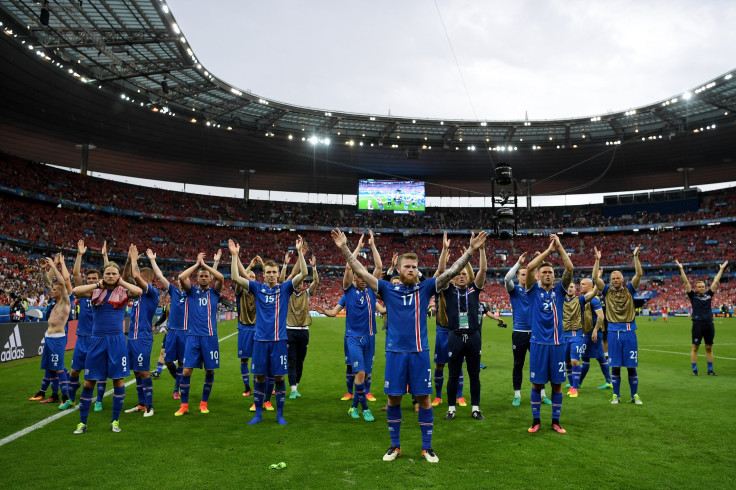England vs. Iceland 2016: Prediction, Date, Time For Euro 2016 Round Of 16 Match

For much of a frenetic final day of Euro 2016’s group phase, it appeared that England was set for a Round-of-16 meeting with old rival Portugal, a country which had knocked the Three Lions out of both Euro 2004 and the 2006 World Cup. But a last-gasp winner from Iceland against Austria, which prompted surely the best bit of commentary of the tournament, meant the outsiders jumping up into second place in Group F and booking a meeting with England in Nice on Monday.
Roy Hodgson's side no doubt sighed in relief at avoiding Cristiano Ronaldo and Co. in an elimination match. But Iceland has shown, both in qualifying ahead of the Netherlands and in finishing above the fancied duo of Portugal and Austria in its group, that it is not to be overlooked.
“I saw them a while ago when they played Holland in the qualifiers, and they were a very good, organized team, difficult to break down,” England captain Wayne Rooney said at a press conference on Thursday. “Similar to the games we’ve faced already in this tournament, we know it’s going to be a tough game for us to break them down and it’s important that we play with a real high tempo and tire them out and then take our chances when they come.”
It certainly promises to be a whole lot tougher than the last time Rooney lined up against Iceland. That came in England’s final warm-up game ahead of Euro 2004 at Wembley, when Rooney hinted at the breakout tournament he was about to enjoy by scoring a double in a 6-1 England win.
Such a result was hardly an outlier at the time for Iceland. The Nordic nation, with a population of under 333,000, was not expected to do big things in international competition and had duly filled the role of minnow since playing its first match in 1930. As recently as four years ago, Iceland lost six of its eight matches in qualifying for Euro 2012, beating only Cyprus, and was ranked No. 133 in the world.
But the seeds of one of European soccer’s most remarkable rises had already been sown. A huge investment in coaches and facilities, particularly indoor pitches in a country where winter days can feature 20 hours of darkness, has transformed Iceland’s fortunes.
There may still be a shortage of star names, perhaps with the exception of Swansea City’s Gylfi Sigurdsson, but there is a squad of players who play at a good level across Europe. And that is all enhanced by tremendous spirt and organization under joint coaches Lars Lagerback and Heimir Hallgrimsson.
Iceland has already shown that qualifying for a first major tournament was not the limit of its ambitions or potential. In the group stage in France, Iceland went undefeated, drawing 1-1 with Portugal and Hungary before that famous win over Austria.
Sono seriamente preoccupato per il telecronista islandese ___ pic.twitter.com/H5UFxstjdh
— Daniele Mari (@danmari83) June 22, 2016
Like Iceland, England came away from the group stage with a lone victory and two draws, and accompanied by the typical hyperbolic reaction from the English media. A dominant performance against Russia, although it yielded only a point after the concession of a late equalizer, and a last-gasp win over its neighbor Wales led to a raising of expectations across the English Channel. But the positive sentiments emphatically evaporated after a goalless draw with Slovakia that saw England drop down into second in its group behind Wales.
The truth, as is usually the case, lies somewhere in between. England has done what it has needed to do in order to get through a group stage in which it was always going to be difficult to shine against three teams with ambitions to do little more than sit back and frustrate. At the same time, some key players, most notably Harry Kane and Dele Alli, have clearly been below par. The intensity and fluidity, which seemed based around the styles of Tottenham and Liverpool, has been sorely absent.
On no player has opinion varied more wildly than the man who scored twice against Iceland 12 years ago. Many had called for Rooney, England’s record goalscorer, to be dropped going into the competition. Lacking the vigor of his youth, the 30-year-old had been moved into midfield for Manchester United and doubt about his role with his country was prevalent. But the narrative, even after two middling performances in midfield, had changed to such an extent after the first two matches that Hodgson was then lambasted for resting Rooney, and others, for the match with Slovakia.
The bigger concern, though, is that Hodgson does not appear to know his best lineup. The all-or-nothing roll of the dice when 1-0 down to Wales at halftime of England’s second match when bringing on Jamie Vardy, Daniel Sturridge and then Marcus Rashford up front ultimately worked, but did not say much for the success of the original plan.
After six changes against Slovakia, much interest will be paid to Hodgson’s starting lineup when England tries to avoid becoming the latest victim of Iceland’s fairytale.
Prediction: For England, it promises to be a repeat of its group-stage contests, with Iceland likely to be happy to defend with two banks for four before aiming to take what it can get on the counter-attack. Thus far that strategy has worked well for Iceland, while England has struggled to find the tempo and ruthlessness in the final third to break sides down. Thus it promises to be a nervy occasion for England, but one which in which its greater quality should eventually prove decisive.
Predicted score: England 2-1 Iceland
Date: Monday, June 27
Time: 3 p.m. EDT
© Copyright IBTimes 2024. All rights reserved.











